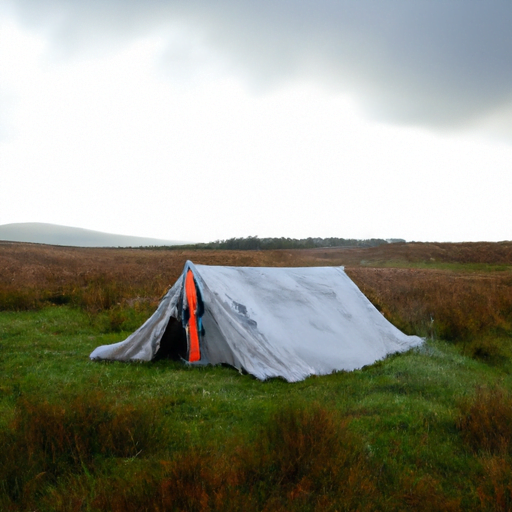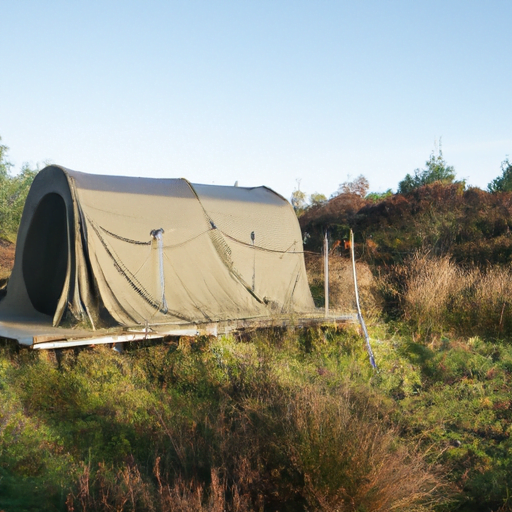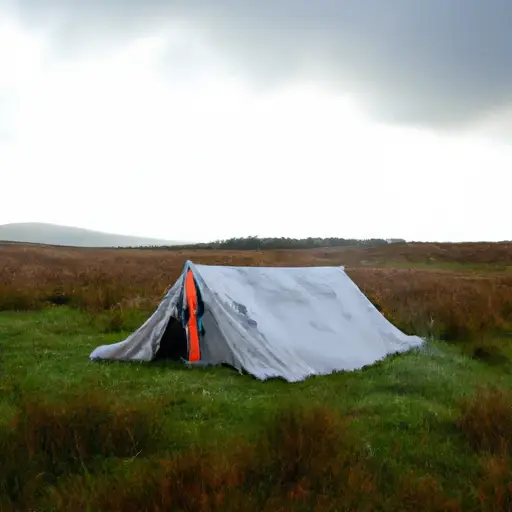Have you ever wondered what it would be like to live off the grid? You know, disconnect from the hustle and bustle of modern life, and enjoy the simplicity and self-reliance that comes with living closer to nature. Well, if you’ve ever considered living off grid in the UK, you might be curious about your accommodation options. Can you actually live in a tent on your own land?
The short answer is, yes, you can live in a tent on your own land in the UK. However, there are some things you need to consider and regulations you need to be aware of. While living in a tent might sound like the ultimate freedom, there are certain legal and practical aspects you’ll need to navigate. In this article, we’ll delve deeper into the topic and explore the ins and outs of living off grid in a tent on your own land in the UK.
Living off grid in a tent certainly has its appeal. But before you pack up your belongings and set up camp on your own land, there are a few things you’ll need to think about. Firstly, you’ll need to research and understand the regulations and planning permissions that apply to living on your own land in a tent. It’s also important to consider the practicalities of living in a tent long-term, such as access to water, sanitation, and electricity. In the next section, we’ll discuss these aspects in more detail, so stay tuned to learn more about living off grid in a tent in the UK. Living off grid has become an increasingly popular lifestyle choice for those seeking independence, self-sufficiency, and a closer connection with nature. It offers the freedom to live on your own terms, away from the confines of modern society. However, before embarking on this journey, it is essential to understand what living off grid entails, the advantages and disadvantages it brings, and the challenges and considerations involved.

What does it mean to live off grid?
Living off grid simply means that you are not reliant on public utilities such as electricity, water, and sewage systems. Instead, you generate your own power, source your own water, manage your waste, and adopt a sustainable and self-sufficient lifestyle. It often involves living in remote or rural areas, away from densely populated cities.
Advantages and disadvantages of living off grid
Living off grid has several advantages. Firstly, it offers an escape from the fast-paced, hectic lifestyle that many people find themselves trapped in. It allows you to reconnect with nature, breathe in fresh air, and enjoy the tranquility of rural settings. Living off grid also promotes self-reliance and personal growth as you become adept at generating your own power, growing your own food, and managing your own resources.
However, off grid living also comes with its share of challenges. One of the main disadvantages is the lack of access to basic amenities and services. Sourcing water and managing waste can be a challenge, especially in remote areas where traditional infrastructure is not readily available. Additionally, generating electricity can be a complex task, requiring the use of alternative power sources such as solar panels or wind turbines. Moreover, securing food and supplies in remote locations may require careful planning and preparation.
Challenges and considerations of off grid living
Living off grid requires careful consideration of various factors. Legal aspects concerning land laws and regulations are crucial to understand. In the UK, it is essential to navigate permits and permissions required for off grid living. Zoning and planning restrictions must also be taken into account to ensure compliance with local regulations.
Living in a tent on your own land can be a viable option for off grid living. However, several considerations must be made. Choosing the right location for your tent is crucial in terms of safety, accessibility, and environmental impact. It is important to select a spot that offers shelter from the elements and is close to essential resources such as water sources and arable land.
Setting up a safe and comfortable living space is paramount when living in a tent. Proper insulation, ventilation, and waterproofing are essential to protect against the vagaries of the weather. Additionally, investing in comfortable bedding and furniture can help create a cozy and livable environment.
Having the right equipment and supplies is vital for tent living. Adequate storage for food and other necessities, cooking facilities, and a reliable heating source should be considered. It is also important to have emergency supplies and tools readily available in case unforeseen situations arise.

Access to amenities and basic services
Sourcing water and managing waste can be challenging when living off grid. If you do not have access to a natural water source like a stream or well, rainwater harvesting and filtration systems can be implemented. Similarly, composting toilets or septic tanks can be used as an environmentally friendly option for waste management.
Generating electricity is a crucial consideration for off grid living. Solar panels, wind turbines, or hydroelectric systems can provide renewable energy sources. It is essential to assess your power needs and invest in the appropriate equipment.
Securing food and supplies in remote areas can be achieved through various means. Setting up a vegetable garden, adopting permaculture techniques, and practicing sustainable farming methods can help in achieving self-sufficiency. Additionally, foraging for wild edibles and preserving food through techniques like canning and drying can help fill the food gap.
Community and social interactions
While living off grid can provide solitude and peacefulness, it is still important to maintain social connections. Building and maintaining relationships with like-minded individuals can help alleviate feelings of isolation. Engaging with local off grid communities and organizations can provide a platform for sharing experiences, resources, and skills. Additionally, pooling resources with neighbors can result in shared costs and increased self-sufficiency.
Sustainability and self-sufficiency
Practicing sustainable methods is at the core of off grid living. Conserving water, reducing energy consumption, and recycling are essential practices. Adopting permaculture techniques for gardening, such as companion planting and crop rotation, can help create a self-sustaining ecosystem. Raising livestock or keeping chickens can also provide a sustainable source of food and other resources.
Health and safety considerations
Ensuring safety in a tent living setup is crucial. Regular maintenance of the tent, checking for wear and tear, and reinforcing it as needed is important. Being prepared for inclement weather and having emergency plans in place is essential for personal safety.
Addressing health concerns and access to medical assistance is another consideration. Living in remote areas may mean limited access to healthcare facilities. It is important to have a first aid kit on hand and be knowledgeable about basic medical procedures. Additionally, having a means of communication, such as a satellite phone or radio, can be crucial during emergencies.
Alternate housing options on your own land
While living in a tent may be a suitable option for some, there are other sustainable and affordable housing options to consider. Building small cabins, tiny houses, or earthships can provide more permanent and comfortable living arrangements. Alternatively, off grid mobile homes or converted vehicles offer mobility and flexibility.
Financial and cost implications
Living off grid can have financial implications. While the initial setup costs may be higher, the long-term savings from reduced utility bills and increased self-sufficiency can be significant. It is important to budget for off grid living expenses, including equipment, supplies, and maintenance.
Earning income while living off grid can be accomplished through various means. Remote work or freelancing opportunities can provide a sustainable income stream. Additionally, exploring ways to monetize skills or resources within the off grid community can be beneficial.
It is important to compare the cost of traditional living with off grid living before making a decision. While off grid living may have higher upfront costs, it can ultimately lead to a more sustainable and affordable lifestyle.
Conclusion
Living off grid in a tent on your own land in the UK is indeed possible. However, it requires careful consideration of legal aspects, practical challenges, and personal motivations. By understanding the advantages and disadvantages, addressing the challenges associated with off grid living, and adopting sustainable practices, you can create a fulfilling and self-sufficient lifestyle off the grid. Whether you choose to live in a tent, a cabin, or a mobile home, off grid living offers a unique opportunity to reconnect with nature, embrace self-reliance, and live on your own terms.




